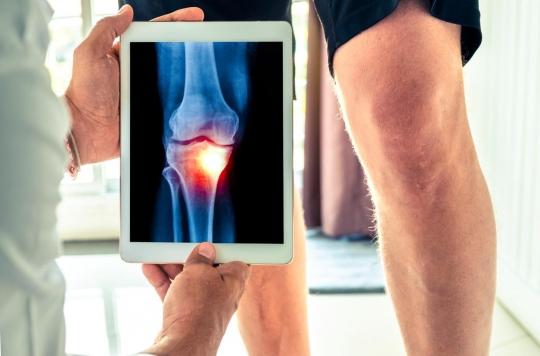For patients suffering from osteoarthritis, corticosteroid injections could be harmful and lead to poorly understood complications. This is shown by a study conducted by researchers at Boston University School of Medicine (BUSM). But these conclusions are disputed by Professor Francis Berenbaum, rheumatologist, attached to the Hospitals of Paris.

Should corticosteroid injections to treat osteoarthritis be questioned? A study conducted by American scientists points to their harmful nature for certain patients and the risk of poorly understood complications. But the rheumatologist Francis Berenbaum, attached to the hospitals of Paris, affirms that these local treatments also have advantages by allowing, in particular, to avoid the use of painkillers such as opioids or tramadol.
Potential complications
In their study published in the journal Radiology “, the American researchers examined 459 patients who had received one to three injections of corticosteroids in a knee or a hip. Among these patients, 36 of them, or 8%, hads complications linked to these infiltrations, as shown by medical imaging tests. The researchers noted a acceleration of the progression of their osteoarthritisas well as other negative effects including subchondral insufficiency fracture, i.e. smooth bone tissue of the joints, and osteonecrosis (death of bone cells) or rapid joint destruction with bone loss.
Ali Guermazi, professor of radiology at Boston University and co-author of the study, told CNN that these conclusions were based on another study of 2019 which showed similar results. “The evidence is accumulating, and the negative effects are likely to spread further,” he says, estimating that “the figure of 8% of patients with complications observed in the study could still progress”.
Results to put into perspective
Osteoarthritis occurs when the cartilage that cushions the friction of the bones in the joints wears down over time. Doctors often prescribe steroid injections to help with short-term pain relief, particularly for patients who are “the most severe, the most painful, the most limited and therefore at higher risk of having a poor natural course of their osteoarthritis,” says Professor Francis Berenbaum. They may also include patients who cannot tolerate acetaminophen or nonsteroidal anti-inflammatory drugs.
And he explains that infiltrations should not be ruled out a priori: “The risk is that instead of treating locally, we go back to much more dangerous general treatments (opioids, tramadaol, etc.)”, assures you. -he.
The conclusions of this study are therefore, according to him, to be followed with parsimony. Indeed, “infiltrated patients are often more serious cases than non-infiltrated patients and the observations of this study could have no relation to the infiltrations themselves specifies Francis Berenbaum who therefore warns patients who may – to be heard about this study calling into question the infiltrations: “This one absolutely does not allow to conclude to that!”.
The co-author of the study, Ali Guermazi, acknowledges that his work is only an observational study and that further research is necessary to support his results and better understand the potential risks to be taken into account before proceeding. Has infiltrations in the knee or hip.

.















